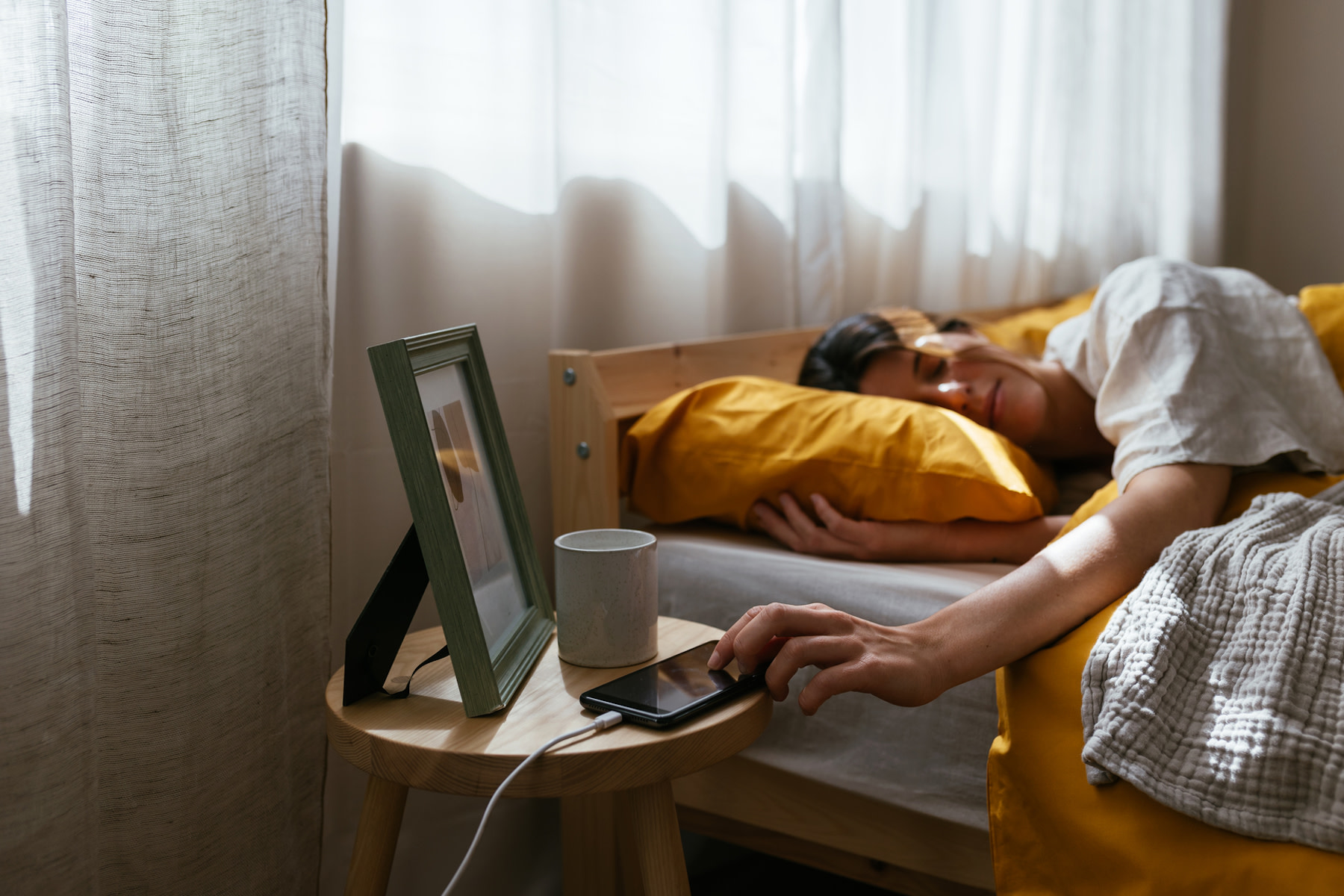
How to Fix Your Sleep Schedule for Good
Trust us, you're going to feel so much better.
By Michelle Konstantinovsky•
Why Our Sleep Schedules Get Off Track
How to Reset Your Sleep Schedule
Tips for Fixing Your Sleep Schedule
How Long Does it Take to Adjust to a New Sleep Schedule?
Benefits of a Fixed Sleep Schedule
The Takeaway
Whether you were burning the midnight oil at work or found yourself accidentally immersed in a reality TV marathon, chances are you’ve experienced the unpleasant effects of a disrupted sleep schedule at some point in your life. While we all know how vital sleep (particularly deep sleep) is to overall health, happiness, and, yes, athletic performance, life happens.
Everything from stress and lifestyle changes to jet lag, job obligations, and drinking (caffeine and alcohol) can impact your sleep routine. The good news is, once you figure out the source of your skewed sleep schedule, you can take quick, actionable steps to get back on track and get some solid rest. Here’s what the experts say about how to fix your sleep schedule.
Why Our Sleep Schedules Get Off Track
When it comes to living your best, healthiest life, there’s nothing negotiable about sleep; just like nutrition and exercise, it’s an essential part of your overall well-being. Not only do our brains and bodies require rest to repair and perform optimally, but skimping on sleep can raise your risk of chronic health problems, affect your ability to think clearly, and hinder your social relationships. (Ever tried chatting up someone who’s sleep-deprived? It’s not usually pleasant.)
Inadequate sleep (generally meaning less than seven hours a night) can negatively affect your heart, hormones, metabolism, respiratory system, and immunity, and seriously affect memory and cognition. So, in short, sleep matters—a lot.
But even those of us with the very best intentions for a healthy sleep routine can get thrown off course for any number of reasons. “These can include things like stress and anxiety because they can lead to a racing mind which may lead to insomnia,” says triple-board-certified sleep medicine physician and founder of Restful Sleep MD, Funke Afolabi-Brown, MD. “Irregular work schedules, shift work, and demanding work and school loads will also lead to poor sleep routines due to changing schedules.”
Even if you maintain a strict and rigid 9 to 5 work schedule, there are plenty of other reasons your sleep could suffer…and one of them is in front of your eyeballs at this very moment. “The use of smartphones, tablets, computers, and other electronic devices before bedtime can interfere with the body's natural sleep-wake cycle,” Dr. Brown says. “The blue light emitted by these devices can suppress the production of melatonin, a hormone that regulates sleep.”
Another common cause of a disrupted sleep schedule is what University of Arizona College of Medicine associate professor of psychiatry Michael A. Grandner, PhD, calls “social jet lag.” “We have a natural inclination to delay bedtime until we are ‘ready’ to safely bed down for the night,” says Grandner, who is the director of both the university’s Sleep & Health Research Program and Behavioral Sleep Medicine Clinic. “We’re concerned with getting everything done at the end of the day which leads to a longer wake period, making it harder to prepare our mind and body for sleep at the right time. By the time we stop what we are doing and wind down, it's a little later than we wanted. Then this can disrupt the next day's schedule by throwing off our internal clocks.”

Of course, actual jet lag is a common culprit for a screwed-up sleep schedule too. “Traveling across time zones can lead to jet lag, where your body's internal clock is out of sync with the local time,” Dr. Brown says. “It can take several days to adjust to a new time zone, leading to sleep disturbances.”
Those late-night TV marathons can also wreak havoc on your sleep schedule, notes Cathy Goldstein, MD, MS, clinical professor of neurology at the University of Michigan Sleep Disorders Center. “Under the guise of ‘self-care’ many people will stay up late watching Netflix because their days are so jam-packed,” Goldstein says. “They end up dozing off while watching TV, and then when they finally get into bed, they can’t fall asleep because their earlier dozing off has reduced their homeostatic sleep need.” Goldstein has a clever term for this troubling trend: “sleep hunger."
And while many of us try to remedy a shoddy week of sleep by staying under the covers for much longer on the weekends, Grandner says that strategy can actually backfire. “Another common reason people's schedules get thrown off is by sleeping in too late in the morning,” he says. “It's nice to catch up on sleep but if you sleep in too late, you don't give yourself enough time to be ready for sleep the next night, which leads to insomnia, and the cycle continues. It's better to get up at the same time every day. If it means getting a little less sleep, that can make things complicated and you have some tough choices to make.”
In addition to all these potential sleep schedule disruptors, Goldstein adds a few more usual suspects. “Other common avoidable sleep ‘thieves’ are alcohol, which increases wakefulness the second half of the night, and caffeine after lunch (it has a half-life of up to five hours),” she says. Other reasons include “not getting light in the first part of your day—because morning/daytime light is needed to keep our internal biological clock ‘set’ appropriately—and inactivity, because exercise promotes deep, restorative slow-wave sleep.”
Sometimes much more rare sleep disorders like sleep apnea, insomnia, and restless legs syndrome, as well as psychiatric conditions like depression and anxiety, can also be to blame for a messed up sleep schedule. “Pregnancy, perimenopause, menopause, and medical illnesses like thyroid disease can all also significantly disrupt sleep, so if other symptoms accompany your sleep disturbance or your sleep problems persist despite good habits, please seek medical attention,” Goldstein says.
How to Reset Your Sleep Schedule
Now that you know the million potential reasons your sleep schedule could be off-kilter, what in the world can you do about it? Plenty, according to the experts.
“In resetting your sleep when you go off track, you should work on making gradual changes to your sleep schedule rather than trying to reset it all at once,” Dr. Brown says. “Shift your bedtime and wake time by 15 to 30 minutes earlier or later each night until you reach your desired schedule. Reestablish a consistent sleep time and wake time to help reset your circadian rhythm and realign your sleep-wake cycle. Practice healthy sleep habits including avoiding caffeine and alcohol before bed, keeping a bedroom that's cool and dark, as well as watching your diet before bed. And finally, be patient with yourself.”
“Pulling an all-nighter is absolutely never a good idea and will not ‘reset’ your sleep schedule,” Goldstein adds. “It causes severe daytime dysfunction, is detrimental to your metabolic, immune, and endocrine function, and will disrupt the circadian rhythm because you get light at a time when your body is not expecting it.”
What Is the Ideal Time to Go to Bed and Wake Up?
Like most aspects of health and wellness, sleep doesn’t fit a one-size-fits-all formula. “The ideal sleep schedule is one where you sleep about seven to eight hours and most of it is in your biological night, which probably means you're going to bed sometime after 8 PM and waking up sometime before 9 AM,” Grandner says. “Other than that, it doesn't matter too much.”
Rather than subscribing to a certain timeframe, the key is to find your ideal schedule and stick to it at all costs. “The ideal sleep schedule is one that is consistent,” Goldstein says. “Pick a seven- to nine-hour window that works for your body clock. For most people that is 11 PM to 7 AM, but there is biological variability in our circadian timekeeping systems so some are earlier, others are later. And of course, your schedule may also dictate your sleep timing.”

Tips for Fixing Your Sleep Schedule
While there are many ways you might reset a disrupted sleep schedule, Goldstein has a thoughtful hour-by-hour action plan that you can implement right away.
16 hours before bedtime: Wake up! “Set an alarm and get up at the same time, every day, regardless of how good or poor your sleep was the night before,” Goldstein recommends.
16 to 9 hours before bedtime: Get as much morning and daytime light as possible. “Natural is best but a one-hour exposure to a light box after awakening, or when you get to your office in the morning, can work wonders for those of us in darker locales in the winter.”
16 to 4 hours before bedtime: Get moving. “Even though you’re tired from your sleep being off track, exercise is critical to good sleep so don’t skip those workouts—even if you have to turn down the intensity.”
4 hours before bedtime: Dim the lights. “Most indoor light is LED which is blue-enriched, the wavelength our circadian clock is most sensitive to,” Goldstein says. “Light within four hours of your usual sleep time can make it harder to fall asleep at bedtime and harder to wake up in the morning. Ideally, you’d stop using backlit electronic screens at this time too, but I know that’s a big ask, so at least dim your screens and put on night mode. For extra credit—or if it's hard to alter your light environment or you absolutely must use a computer—put on amber-colored blue light-blocking glasses four hours prior to desired bedtime.”
1 hour before bedtime: Wind down. “You can’t go from 90 MPH to zero,” Goldstein says. “Cue your body that it's time to sleep with a wind-down routine. If you like a warm bath or shower, make sure this is at least one hour before bedtime as the heat loss process facilitates sleep.”
If, after all that prep, you still can’t fall asleep, Goldstein says it’s best to leave the bedroom and do something quiet in dim light until you feel drowsy. “Someone once told me early in my training, ‘Falling asleep is like falling in love; you can’t try too hard,’” she says. “So if sleep isn’t coming, don’t lie in bed forcing it.” And if you’re still having sleep issues after several weeks of trying these tips, consult a professional—there may be something else at the root of your struggles.
How Long Does it Take to Adjust to a New Sleep Schedule?
While you can start making tangible changes to your sleep habits right away, don’t be surprised if you don’t see an overnight payoff. “On average, it may take about one to two weeks to adjust to a new sleep schedule and experience noticeable improvements in sleep quality, daytime alertness, increased productivity, and improved physical health,” Dr. Brown says.
Grandner says that lifestyle changes can have a positive effect on sleep scheduling in as little as a few days for some people, but other underlying causes may take longer to resolve. “If the schedule disruption is caused by jet lag (a mismatch between a person's internal clock and external schedule), it can take about one time zone per day,” he says. “If the schedule disruption is caused by insomnia (where your body learns to have difficulty sleeping), it can require the help of a professional. But even then, we can usually fix insomnia in six to eight sessions.”
Benefits of a Fixed Sleep Schedule
Considering the negative effects an inadequate sleep schedule can have on your physical, emotional, and psychological health, imagine the profound impact a spruced-up routine could have on all aspects of your life. “Benefits you may notice pretty immediately from improving your sleep are better alertness, improved mood, better cognitive performance, efficiency, and productivity,” Goldstein says. “Plus improved physical performance—and even better appearance!”
Getting enough sleep may help prevent sickness, lower your risk for serious health problems, reduce your stress, improve your mood, and aid in decision-making. And while not everyone has the luxury of setting a sleep schedule that fits the traditional time frame between 11 PM and 7 AM, there are plenty of tips for navigating and counteracting the potential negative impact that shift work and jet lag have on sleep, so don’t hesitate to help yourself no matter what the circumstances may be.
The Takeaway
In a perfect world, we’d all be getting just the right amount of shut-eye each and every night to leave us feeling refreshed and energized morning after morning. In reality, we all have obligations, stressors, responsibilities—and yes, television habits—that can mess with our sleep schedules. By taking preventative steps to stay as consistent as possible, and prepping your environment for rest hours ahead of bedtime, you’ll stand a much better shot at getting your sleep schedule back on track.
And if you do find your regular sleep routine thrown for a loop, don’t panic. “You may want to over-correct and make up for it, but this may just create more imbalance,” Grandner says. “Just get back to a balanced, regular schedule as soon as you can and keep it. If you have a day where you eat too much, starving yourself the next day doesn't help. Just get back to a regular, healthy diet and you'll be fine.”
This content is for informational and educational purposes only and does not constitute individualized advice. It is not intended to replace professional medical evaluation, diagnosis, or treatment. Seek the advice of your physician for questions you may have regarding your health or a medical condition. If you are having a medical emergency, call your physician or 911 immediately.
Level up your inbox.
Subscribe for a weekly dose of fitness, plus the latest promos, launches, and events.
By providing your email address, you agree to receive marketing communications from Peloton.
For more about how we use your information, see our Privacy Policy.


